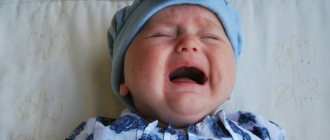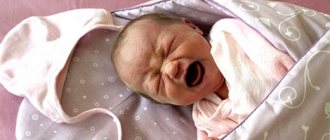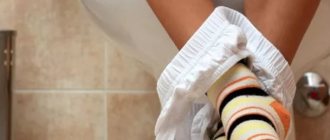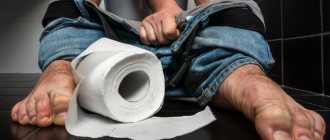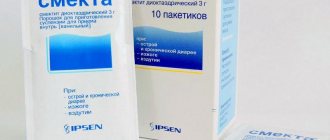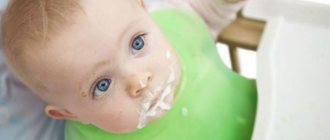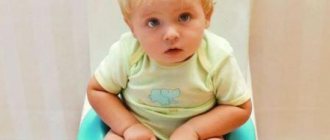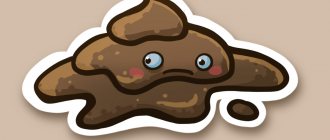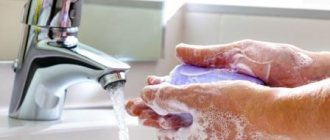As you know, the digestive system is very closely related to the human immune defense. Undeveloped immunity is the key reason for the increased susceptibility of children to various types of gastrointestinal disorders. And one of the manifestations of such disorders is diarrhea, or, in common parlance, diarrhea. You never expect this misfortune - it can especially often overtake a child at the most undesirable period - when you are on the road or visiting. And if you delve into anatomy and physiology, you can find a fairly convincing explanation for this. But we will try to understand the problem, getting closer to everyday life - we will find out what can cause diarrhea and how to deal with it.
Why does diarrhea occur?
Let's start with the fact that diarrhea is loose stool that continues over time and is not controlled by the child.
With diarrhea, the frequency of stools becomes more frequent. Defecation occurs up to five or more times a day. However, there are no strict criteria in this matter. The amount of liquid stool may depend not only on age, but even on the type of feeding (breastfeeding, bottle-feeding). Of course, with diarrhea you have to deal not only with the consequences, but also with the problem that caused it. Before you decide how to treat diarrhea in a child, you should definitely find out the cause of loose stools. It should be understood that diarrhea is not just a temporary nuisance. Diarrhea, which may seem harmless at first glance, can be caused by very serious problems. And you can’t do this without medical advice. By using certain methods of treatment - often erroneous - you are playing a game akin to “Russian roulette” - it will help or not. Often, precious time is lost and irreversible complications begin.
What can cause diarrhea? The most common reasons:
- numerous intestinal infectious diseases;
- intestinal dysbiosis (consequences of antibiotic treatment);
- inflammatory processes (appendicitis, otitis media, pneumonia);
- liver diseases;
- helminthic infestations.
In addition, in infants, diarrhea can be triggered by the introduction of the first complementary foods or improper nutrition (overeating). It is important to understand that diarrhea is only a sign of a disease that needs to be diagnosed and treated. The fight against diarrhea involves detoxification and helping the body suffering from dehydration.
Doctor Komarovsky: diarrhea in a child, treatment methods
The main mistake parents make when treating diarrhea is the use of antibiotics. This is absolutely impractical; it is better to use medications that can normalize the contractile functions of the intestine, as well as maintain its microflora. In addition, you should not self-medicate or rely on the experience of family and friends; only a specialist with a medical education can prescribe certain medications. It often happens that the doctor will advise you not to carry out drug therapy, but to limit yourself to establishing a plentiful drinking regime.
How to treat diarrhea in a child under one year old?
Diarrhea is especially difficult for children under one year of age.
The baby's body is very sensitive to fluid loss. These little creatures, already constantly in need of care and attention, crying and capricious, experience additional unpleasant sensations when diarrhea appears. We can say that in proportion to their state of health, their mood worsens. There is a specific treatment regimen for diarrhea, which includes a number of mandatory measures. How to treat diarrhea in an infant? There are no special recommendations here - treatment is based on the use of traditional drugs: Regidron, activated carbon, Imodium, Enterosgel. But this or that medicine should only be used as prescribed by a pediatrician who has assessed the child’s condition. A separate recommendation for infants is to increase the number of breastfeedings. Mother's milk is a faithful assistant in any problem. Diarrhea often appears after introducing any product into the baby’s diet. At 10 months, when breastfeeding is replaced by various complementary foods, there is a high probability of bowel dysfunction. How to treat diarrhea in a 10 month old child? It is important, first of all, to replenish fluid loss by providing the child with the daily fluid requirement - this is the main task of parents. All other recommendations must be made by the doctor. Among the medications that can be prescribed to a child, I would like to note the particularly popular Smecta and Imodium. Today you can buy very useful tests in pharmacies: for acetone and for rotavirus. Depending on the results, a treatment regimen is selected. Special attention should be paid to nutrition: if there is diarrhea, the child should not be given any food other than rice porridge, mashed potatoes and biscuits.
Causes of diarrhea in a baby
A newborn's stool depends on many factors; at the age of several months, bowel movements can occur up to 6 times a day, especially if the baby is breastfed. In the process of growing up, the introduction of complementary foods, bowel movements become less frequent, and with a complete transition to artificial nutrition, bowel movements occurring once a day are considered the norm.
These phenomena do not pose any danger, as the baby’s body adapts to external influences, and there is no need to do anything about it.
If there are no associated factors, and the child begins to defecate watery masses, this symptom indicates the onset of diarrhea.
When diarrhea begins, it is necessary to take immediate action; the danger of this condition is dehydration of the newborn. Constant loss of fluid leads to a deficiency of beneficial microelements, loss of electrolytes and can lead to seizures.
There are many reasons for diarrhea in infants:
- reaction to taking antibiotics;
- coli;
- infectious or colds;
- parasite infection;
- reaction during teething;
- food intolerance.
How to treat diarrhea in a one-year-old child?
When a baby turns one year old, he crosses the most important milestone in his life. Now this is not a helpless baby, but a real little person, rapidly developing and learning about the world. However, his immune system remains imperfect. And the ability to move around and indiscriminately put any object that attracts his attention into his mouth increases the risk of gastrointestinal disorders. Infancy is behind us, worries have taken on a different character - the child requires communication and attention. Infections and pathogenic microbes lurk at every step, so it is advisable to obtain information explaining how to treat diarrhea in a 1-year-old child in advance - they will definitely come in handy and will help the baby get out of an unpleasant condition with minimal losses to health. Regardless of whether additional symptoms (fever, vomiting, cramps) are present with diarrhea, you must call a doctor. After this, without wasting precious time, you should begin immediately feeding the child with glucose-salt solutions, which effectively restore the water-salt balance.
How can you treat diarrhea?
How to cure diarrhea in a child so that the process is most effective and the disease does not leave consequences? First of all, you need to call a pediatrician at home, who will prescribe medications to treat diarrhea. You also need to understand the reason why the diarrhea started. If loose stools are affected by disruptions in the diet, then you need to adjust the child’s menu.
The baby should be given a drinking regimen and given anti-diarrhea medications (activated carbon, smecta, enterosgel). When treating diarrhea, it is necessary to monitor the general condition of the baby, his temperature; if it increases, the child should be given an antipyretic drug. The picture is slightly different for diarrhea caused by infection or poisoning.
For diarrhea, the following groups of medications are prescribed:
- Enterosorbents relieve intoxication and strengthen the intestines.
- Probiotics are a complex of beneficial bacteria that improve the condition of a child’s gastrointestinal tract with dysbacteriosis.
- Antimicrobial medications - get rid of the causative agent of diarrhea of viral etiology, and also slow down intestinal motility.
Prescribing antibiotics for diarrhea is not always useful, since their aggressive effect on the intestinal microflora can aggravate the situation.
Diarrhea in a child is not always a sign of infection or poisoning. If there is no fever, the baby is active, there are no suspicious inclusions in the stool, treatment can be done at home.
You cannot do without professional help if:
- the temperature rose sharply;
- vomiting began;
- the child is very weak;
- there is blood and foam in the stool;
- the stool has acquired an atypical color;
- diarrhea does not stop for more than a day.
Children under one year old deserve special attention. Due to their low weight, they lose fluid very quickly, and dehydration develops very quickly.
If such signs occur, you must contact the infectious diseases department. After examining the child and examining the stool, treatment is prescribed. If a bacteriological or viral nature of diarrhea is suspected, a laboratory examination of stool is performed.
Treatment in a hospital lasts several days and depends on the age, condition of the child and the type of infection.
Alimentary diarrhea can be stopped at home. To do this, it is enough to exclude the irritating factor - any food. Loose stools usually disappear after a few hours.
It happens that, against the background of the disorder, the appetite remains at the same level and the child asks to eat. You can offer him a cracker or unleavened cookies with weakly brewed tea.
It is strictly forbidden to feed the child:
- fermented milk products;
- fresh fruits, vegetables and juice from them;
- solid food.
The biggest danger with long-term diarrhea is dehydration. To replenish lost fluid, you need to give clean water, weak tea (weakly sweet without lemon), and dried fruit compote to drink after each bowel movement.
If diarrhea is accompanied by vomiting, the amount of liquid should not exceed 20 ml, but you need to drink every 10-15 minutes.
Infants do not stop breastfeeding. It must be remembered that mother’s milk will not be able to replace the fluid lost by the body, so between feedings you need to pour 5 ml of water into the baby’s mouth.
While waiting for an ambulance, you can give an absorbent agent (Smecta or Activated Carbon). These drugs are not absorbed into the blood, so they are harmless even for babies.
Drug therapy for diarrhea in children consists of several areas:
- Restoration of water-salt balance.
For this, use Regidron or Glucosalan. The drug in powder form is diluted in warm water and given in small sips after 5-10 minutes.
Absorbent preparations will cope with this task: Activated carbon (in powder, tablets or gel form), Smecta, Enterosgel. These products absorb not only toxins, but also molecules of other medications, so you need to maintain an interval of 1.5-2 hours between different drugs.
- Levomecitin, Enturol, Furozalidone are used for antibacterial effects.
- Restoration of microflora is carried out with the help of probiotics and prebiotics: Linex, Enterol, Bifiform Baby.
- Normalization of peristalsis.
For diarrhea accompanied by uncontrolled contractions of the intestines, Loperamide or Imodium is prescribed.
If diarrhea is caused by waste products of helminths in combination with symptomatic treatment, antihelminthic drugs (Nemozol, Pirontel) are prescribed.
The type, form and dosage of medications for diarrhea in children is determined by the pediatrician. It is strictly forbidden to use medications intended for adults.
How to treat diarrhea in children under five years of age?
The child grows, and with it his immunity gains strength.
The body is already capable of coping with many problems. Therefore, diarrhea in children who have crossed the two-year mark cannot be ignored. After all, its cause can be a serious problem - from lamblia to appendicitis. How to treat diarrhea in a 2 year old child? The scheme is traditional: restore the water-salt balance, call a doctor. It is possible that tests will be prescribed - for Giardia, ultrasound, bacterial culture, and other necessary studies. According to the doctor’s decision, the child will be prescribed a suitable medicine from the group of enterosorbents that effectively neutralize toxins accumulated in the body. The most popular and accessible remedy is, of course, activated carbon. The child may also be prescribed Smecta, Polysorb, Linex or Enetrosgel. Since diarrhea disrupts the intestinal microflora, pediatricians often recommend medications containing beneficial lacto- and bifidobacteria: Lactulose, Hilak-forte.
Your baby is growing, but the threat of diarrhea is still present. The main thing is not to forget that each situation can have completely different reasons. And if the previous time you encountered a simple intestinal infection, then there is always a chance that next time your baby will encounter a completely different problem - for example, dysentery, appendicitis, and other dangerous diseases. Therefore, diagnosis comes first! First we find the cause - then we treat it. How to treat diarrhea in a 3-year-old child - with the same traditional drugs. First, we restore the electrolyte balance, then we use enterosorbents, and, if necessary, preparations with bifidobacteria and lactobacilli. The latter often have to be taken for quite a long time (up to a month). A similar scheme should be followed in the future - as the child grows up. Knowing how to deal with diarrhea in a three-year-old child, you will know how to treat diarrhea in a 5-year-old child.
Doctors are doctors, and every mother should know a couple of useful folk remedies that help with diarrhea. There may always be a situation in which a doctor may not be available for a certain period of time. This is where traditional medicine comes to the rescue. Before the doctor arrives, the child can be given rice water, chamomile tea with mint, rosehip compote and hawthorn fruit infusion.
All acute intestinal infections are divided into two groups - bacterial and viral. As you know, antibiotics do not act on viruses, and therefore you should not self-medicate and self-prescribe medications. Experienced pediatricians say that the most important thing with diarrhea is to do no harm. Only by understanding all the symptoms, assessing the condition, prescribing tests and developing a treatment regimen can you achieve effective treatment and a successful outcome.
In conclusion, I would like to know what Komarovsky, a pediatric doctor known for his original approach to treating children, recommends to treat diarrhea in a child. His encyclopedic knowledge and high professionalism are combined with rationalism and healthy optimism. The life credo of many doctors is “do no harm,” and with diarrhea it becomes especially relevant. “Don’t panic,” advises the popular doctor. When parents become agitated, they can make a bunch of irreparable mistakes. Don't mindlessly push medications into your child. Do not give an enema without a prescription. Do not feed your child tasty foods for comfort. Call a doctor, and if the child is less than a year old, call an ambulance. Only by joining forces with doctors and following all their instructions will you come to natural success.
If a child has diarrhea, Komarovsky will tell you how to act and how to treat it. After all, diarrhea in a child, especially before one year of age, makes parents very worried. When diarrhea overtakes an adult, the usual anti-diarrhea remedy is purchased at the pharmacy. Diarrhea in an infant is a complex phenomenon that requires serious attention; it is imperative to call a pediatrician for an examination. Most often, children cannot be treated with adult medications.
According to the doctor, diarrhea or diarrhea in young children is frequent bowel movements about 5-6 times a day, without the ability to restrain the urge to defecate. Also, the nature of the disorder depends on the method of feeding the infant—breast-fed or bottle-fed. According to statistics, babies fed on mother's milk are less susceptible to digestive tract disorders than babies fed formula.
Causes of diarrhea in older children
Diarrhea in older children can be caused by:
- low-quality or prohibited products;
- infectious lesions and acute inflammation;
- lack of food enzymes;
- inflammatory processes;
- helminthic infestations;
- poisoning;
- chronic diseases of the digestive system;
- acute leukemia;
- the use of antibiotics that cause intestinal upset and dysbacteriosis;
- stress;
- strong emotional stress.
What should a mother do if her child has diarrhea without fever for some time? In this regard, Komarovsky says that, most likely, there is a dysfunction of the digestive system, and this may be associated with both physiological and psychological factors. A change in the consistency and color of stool, its becoming watery, and the presence of impurities with a sour odor can be observed as the baby’s menu expands.
Parents are often concerned about the question: “If a child has diarrhea, how to treat it?” Komarovsky advises giving a sick child a medicine that slows down intestinal motility (Loperamide, approved for use from 6 years of age) and supports his microflora (Linex). Before taking medications, you should always consult your doctor. In simple cases, a medical specialist will recommend drinking plenty of fluids instead of anti-diarrhea medications.
About the problem
Diarrhea is a manifestation of the body’s ability to get rid of bacteria and viruses, of which there are a great many around the child. Neither the water that the baby drinks, nor the food, nor the air is sterile. What can we say about playing in the sandbox, crawling on the grass, on the floor, etc. Humans have several such protective “systems”: saliva is designed to destroy microbes at the stage of entering the mouth, bronchial and nasal mucus protect the respiratory organs from getting into them bacteria and viruses, gastric juice effectively destroys those microorganisms that managed to enter the body through the mouth and reach the digestive organs unharmed. Bacteria, which are the indigenous inhabitants, await “uninvited guests” in the intestines. Their task is to prevent malicious agents from taking root.
Diarrhea in a child can be caused by an intestinal infection that enters the mouth through unwashed hands, poorly washed vegetables and fruits, through water, or with food. Often these are bacteria.
Some viruses, such as rotavirus, also cause diarrhea. The intestinal mucosa is an excellent breeding ground for their reproduction, and therefore digestion is disrupted, the intestinal mucosa is irritated and diarrhea occurs.
Signs of diarrhea in a newborn
What does diarrhea look like in a baby? This is a very loose stool that causes discomfort in the intestines and stomach. As a rule, frequent bowel movements are accompanied by severe irritation in the anal area. How can you tell if your baby has diarrhea? (see also important information in the article Loose stools in a breastfed baby>>>)
For infants, it is not the quantity of stool per day that is of decisive importance, but its consistency. With diarrhea, watery diarrhea with mucus is observed in the infant, and there may be blood streaks.
The main signs of diarrhea in a newborn are:
- increased number of trips to the toilet;
- watery stool;
- stool has a sour smell;
- bloating in the baby;
- the presence of impurities, undigested food.
Danger of diarrhea
The most serious danger of diarrhea lies in the possibility of dehydration.
. The younger the child, the higher this risk. Potassium, calcium, and sodium salts, which are extremely important for life, are released with feces. Fluid is rapidly lost. Therefore, it is not as scary if a 3-year-old child goes to the toilet five times a day and does not show signs of dehydration as if five times diarrhea happened to a 6-month-old baby. After all, the baby’s reserves of water and mineral salts are much more meager, and he loses them at a faster rate.
Severe dehydration can cause serious problems with the nervous system and can also be fatal for an infant.
Treatment
If diarrhea is caused by a viral infection, and in addition to frequent trips to the toilet, there are all the signs of a viral illness, you should not feed the child antiviral drugs, they do not help and their effectiveness has not been clinically proven. Antibiotics are also inappropriate because they have no effect on viruses. No special treatment is required; it is enough to provide the child with the right help and prevent dehydration. If diarrhea is the result of food poisoning or intestinal infection, the treatment approach should be the same.
First of all, you should make sure that the baby is not dehydrated.
If a child does not pee for 6 hours, if he cries with dry eyes, without tears, if he has blue circles under his eyes, sharpened facial features, dry lips, tongue, dry mucous membranes - these are very alarming symptoms. Immediate medical attention is required, you need to call an ambulance.
To prevent such a dangerous condition, parents’ actions in case of diarrhea must be coordinated and clear:
- The child definitely needs to drink.
And drink a lot. All drinks should be warm, about 20 degrees, so that the liquid is absorbed and absorbed by the body as quickly as possible. If a child refuses to drink from a cup, he should be fed with a spoon, little by little but often. If he does not drink from a spoon, as children under 7-9 months often do, then you need to draw the liquid into a disposable syringe without a needle and drink from it drip-wise. If the baby resists this method, you should not wait and persuade, you should immediately call an ambulance so that you can administer liquid to the child by drip. - The child needs to restore the balance of salts
.
To do this, Komarovsky advises using ready-made pharmaceutical sachets with oral rehydration products. "Smecta" is suitable, you can buy "Regidron" or "Humana-Electrolyte"
. These drugs must be in every family's home medicine cabinet. If diarrhea has already occurred, and there are no such drugs, you can use a recipe that has received full approval from the World Health Organization: add a teaspoon of salt and the same amount of soda to a liter of water. You can also give your child this solution. - Need control over secretions.
What you drink should stand out. As long as the baby, who has not yet reached the age of one, wears diapers, the mother has nothing to worry about. At any time, she can measure the amount the child drinks, and after 3 hours weigh his used diaper on an electronic kitchen scale to understand whether the water is being excreted normally. If the child is already using the potty, control will also not be difficult. But a 2-year-old child, who has most likely already mastered the toilet, will have to follow on his heels. - The child does not need food.
You should not try to feed him at any cost. Diarrhea will go away much faster if the baby is hungry. You should give food only when he asks for it. If you have diarrhea, you should not eat fatty or sweet foods, drink carbonated drinks and milk. It is better to give porridge, mashed potatoes, crackers from yeast-free bread, vegetable soup with lean broth. - Activated carbon - in the correct dosage.
Another useful drug that should be in your home medicine cabinet. Parents should remember that activated carbon is dosed at 1 tablet for every 10 kilograms of body weight at a time. Thus, a child weighing 10 kilograms is given 1 tablet, and a baby whose weight is 15 kilograms is given 1.5 tablets. Modern medicine recommends modern enterosorbents, which are easier to take. If the financial capabilities of the family allow, you can buy and keep Enterosgel in the first aid kit for such cases.
Possible complications and prevention
In addition to fluid, diarrhea removes from the body the calcium, potassium, and magnesium salts necessary for the child, disrupts the functioning of the central nervous system, and complicates the functioning of internal organs. In severe cases, dehydration is a cause of death. Symptoms:
- no urination for 6 hours;
- dry mucous membranes, lips, tongue;
- blue circles under the eyes;
- haggard, angular facial features;
- crying without tears.
If these symptoms are present, it will not be possible to restore the fluid balance in the child’s body at home on your own. It is vitally important to see a doctor immediately. Pain, cramping in the abdomen, blood in the stool, high body temperature are signs of a progressive disease and require the attention of a specialist.
Dr. Komarovsky considers preventive measures for the occurrence of diarrhea in children to include hand hygiene, control over the quality of food consumed, quarantine in child care institutions when infectious diseases appear in the community, regular medical examinations and attention from the mother and loved ones.
The article has been approved
by the editors
Nutrition after diarrhea
When the diarrhea is safely over, there is no need to immediately cook all those cutlets for your son or daughter and carry all the cookies that the child did not eat while he was ill. You should stick to a gentle diet for a few more days. The diet of a child from 1.5 years old can include porridge, tea, vegetable soups without meat. For a child over 2 years old, you can add one small curd to tea without additives, pieces of fruit or food coloring.
Then the diet should be increased gradually, adding new products to the toddler’s menu every day, starting with boiled meat, steamed cutlets and ending (last) with a piece of chocolate or his favorite candy.
Safe ways to treat diarrhea at home are by fasting and drinking.
Everything else, including the use of antidiarrheal drugs in children, must be agreed with the doctor.
If diarrhea occurs in a baby under one year old, you should definitely consult a doctor.
For children under one and a half years old, the rule is exactly the same, provided that the baby does not feel better within 24 hours. Urgent hospitalization is required by the presence of bloody impurities in the stool.
When visiting a doctor, be sure to remember what the child ate over the last 24 hours and what changes there were in his behavior. It would be great if the doctor could personally evaluate the appearance of feces on the diaper: their color, smell, consistency.
In case of an intestinal infection, the sick little one should immediately be given separate dishes, towels and bed linen. It can be extremely contagious, and therefore it is worth protecting other family members, especially children, from possible infection.
Folk remedies that “experts” recommend on the Internet to treat diarrhea, especially garlic or onion enemas, can be extremely dangerous for a baby. If you drink enough water and compensate for the lack of mineral salts, then diarrhea will subside without complications quite quickly (1-2 days). If diarrhea continues, alternative medicine will not help, but going to a completely traditional doctor will help.
How to treat diarrhea in a child, see the program of Dr. Komaorovsky.
Where does diarrhea come from, what is its nature, how dangerous it is and what to do about it - let's hear what Dr. Komarovsky thinks about this.
Causes of diarrhea
Diarrhea can occur for various reasons, even purely psychological - under the influence of stress. But the most common and dangerous cause of diarrhea is. What provokes the penetration of intestinal infection into the body? In this sense, the most important factor, Dr. Komarovsky believes, is non-compliance with basic hygiene rules and regulations, namely: unwashed hands, improper storage of food, insects - flies and mosquitoes scurrying around the dining table, if we are talking about summer and outdoor living, etc. And no matter how strong the immune system is, there will always be microbes that cannot be neutralized in principle.
Komarovsky notes that the causative agents of intestinal infections are various types of bacteria and some viruses. Both of them, multiplying in the intestines, lead to digestive disorders and inflammation of the mucous membrane of the intestinal walls. The most characteristic and typical consequence of these processes is diarrhea - the main symptom of any infection. Other signs include nausea, vomiting, abdominal pain, fever, general weakness, and lack of appetite.
Prevention of diarrhea
Prevention of intestinal infections is quite obvious and comes down to observing the same hygiene standards:
- you need to wash your hands thoroughly, especially after using the toilet;
- thermally treat water and food;
- follow food storage rules;
- isolate patients and provide them with separate dishes and toiletries.
Komarovsky emphasizes that you should always remember that the most terrible consequence of any diarrhea will be dehydration and loss of salts. If a person can live quite safely without food for two or more weeks, then without water and salts of potassium, sodium and calcium he cannot live even one day. The reserves of water and salts in the child’s body are especially small, so for children, diarrhea due to intestinal infection poses a real threat to health, and sometimes life.
How to treat
The treatment of the above problems must be treated carefully and carefully. Dr. Komarovsky points out that under no circumstances should you self-medicate with antibiotics. They are prescribed for diarrhea only in a few cases, after an accurate diagnosis has been established. Otherwise, the condition of a sick child can only worsen. What to do in such cases, how to treat?
Dr. Komarovsky recommends making sure to drink plenty of fluids. Firstly, it will help to quickly get rid of toxins in case of poisoning by inducing vomiting, which is important in case of poisoning. Secondly, it will relieve dehydration.
The fact is that it is dehydration that is most dangerous when a child has liquid bowel movements. With them, not only a loss of fluid occurs in the body, but also a loss of microelements and salts, without which the normal functioning of the human body is impossible.
Signs of dehydration are dry mucous membranes, dry tongue, baby crying without tears, and lack of urination for a long time. To restore the water and electrolyte balance, the baby must be given water, giving him more fluid than he lost. You can give any drinks as a drink: tea, compote, rosehip decoction. To restore the balance of salts, it is advisable to give drugs like Regidron.
Unfortunately, the cost of such drugs is quite high, despite their low cost. Dr. Komarovsky suggests how to solve this problem. You can make a drink to restore salts in the body yourself at home. To do this, it is enough to dilute two tablespoons of sugar and one teaspoon each of baking soda and table salt in one liter of water. For better absorption, this drink should be drunk warm.
If loose stools are caused by viral infections, then after four to five days the body will produce antibodies to them and the disease will recede. The main thing is to avoid dehydration during this time.
The baby's diet at this time should contain more liquid foods and be vegetarian. It is advisable to avoid dairy and meat. It is preferable to porridge with water, for example, rice, which has astringent properties. In extreme cases, when there is a high temperature, vomiting, liquid bowel movements and the baby refuses to drink, it is necessary to urgently call a doctor.
What to do if you have diarrhea?
Dr. Komarovsky concludes: the true severity of the infection is often determined not by the frequency of stool or smell and color, but by the degree of dehydration.
In this regard, there are certain rules of behavior for the patients themselves and their relatives during the heyday of intestinal infection (regardless of its type):
- First of all, you should analyze what was eaten the day before. By the way, if it turns out that this is not your culinary masterpiece, but a cake from a nearby store, you should think about those who will buy the same thing after you and call the sanitary and epidemiological station;
- Diarrhea in any family member is an alarm for everyone, so you should protect yourself, allocate separate items for the patient to use, keep everyone clean, wash your hands thoroughly, throw away suspicious products, it is better to boil the dishes without sparing disinfectants;
- - these are ways of self-defense of the body, which is trying with all its might to get rid of the muck. Therefore, in the first hours you should not strive to stop diarrhea or vomiting, but, on the contrary, help the body get rid of toxins, that is, drink and vomit, thereby rinsing the stomach and do an enema with ordinary boiled water at 20 degrees (not warmer). All injected fluid should come out;
- The main principle of helping with diarrhea is replenishing salts and fluids. To do this, you need mixtures of salts that are diluted with water - Regidron, Oralit, Glucosolan (sold in pharmacies). You can also give the patient compote of dried fruits, tea, mineral water, herbal infusions, rose hips, etc. The temperature of the drinks should correspond to body temperature so that the liquid is absorbed from the stomach into the blood as quickly as possible;
- Two completely safe ways to treat intestinal infections are drinking plenty of fluids and fasting. You should know and remember this. And among the medications, smecta and activated carbon are safe, the rest can lead to completely different results;
- In case of diarrhea in children under one year of age, it is necessary to consult a doctor. In older children and adults, if there is no improvement within 24 hours, medical attention is also needed.
Diarrhea in a child Komarovsky – 4.3 out of 5 based on 6 votes
When a child has loose stools, especially if his age is less than one year, parents fall into despair. After all, if an adult suffers from diarrhea, then in most cases it is enough for him to use the most outstanding remedy for diarrhea on the pharmacological market, and the problem is solved. With a baby, not everything is so simple, especially if diarrhea is accompanied by vomiting, fever, and in addition, teething has begun. Dr. Komarovsky is a highly qualified doctor specializing in pediatrics. Author of many scientific papers and books on childhood diseases. Thanks to his advice on treating diarrhea in young children, many parents have solved this serious problem in their children.
Table of contents:
Listen to the article:
Methods for treating diarrhea in children of different ages according to Komarovsky
Competent and effective treatment of diarrhea in children does not always include taking medications. The presence of blood in the stool is a symptom that requires consultation with a doctor at any age. How to be treated depends on the diagnosis. We can talk about chronic constipation, followed by diarrhea, and more serious diseases, such as malignant tumors.
In one-year-old children, loose stools appear when new foods are introduced into the diet as complementary foods. In this situation, the baby does not require treatment, but nutritional correction is necessary to reduce intestinal motor function. A newborn baby under one month of age who is breastfed may diarrhea due to the fact that the nursing mother does not adhere to dietary nutrition. It includes in the diet foods that are not included during breastfeeding. The baby experiences nausea and often burps.
Komarovsky recommends treating diarrhea in a child caused by a viral infection with plenty of fluids, excluding the use of antiviral drugs, since the human immune system can fight viruses on its own. A small patient needs to be provided with a comfortable air temperature, a sufficient amount of oxygen and humidity in the room, plenty of fluids, and, if necessary, an antipyretic. If these basic conditions are met, relief will come within 2 days. Taking antiviral medications while treating a viral infection has no proven therapeutic effect, says Dr. Komarovsky. It is a sedative for the adult caring for the child.
The bacterial nature of diarrhea in children in some cases requires drug treatment with antibiotics, which is prescribed by a specialist. On average, antibiotic therapy cures the disease in 5-7 days. It is important not to stop treatment after the patient’s condition improves, but to complete the course to the end. In most cases, the disease will subside in a few days when taking sorbents in the correct dosage, medications that maintain the mineral-salt and water balance of the body, drinking plenty of fluids, rest and fresh air.
Loose stools often appear in children in the first year of life due to teething. If parents are sure that this is the cause of the disorder, it makes sense to give the baby an age-appropriate drug that reduces intestinal motility. Introduce rice broth, a weak infusion of bird cherry or raisins into the baby’s diet.
For any type of eating disorder, Komarovsky considers sufficient drinking to be the main way to combat diarrhea. The task of parents is to ensure that the patient has a regular drinking regime. Ideally, the child should be given water with saline solutions specially purchased at the pharmacy, which retain fluid in the body. To give your baby something to drink, a syringe or a teaspoon will do. To prevent the baby from spitting out the liquid introduced into the mouth, it is worth dripping it with a syringe behind the cheek, so the baby will definitely swallow the moisture. If the patient refuses to drink saline solution, any drinks are suitable to prevent dehydration, even those that Dr. Komarovsky considers harmful in everyday life: sweet soda, juice, etc. To prevent dehydration in a child, any liquid will do.
If children develop diarrhea, doctors prescribe medications that support intestinal microflora. Dr. Komarovsky does not consider this type of therapy necessary and justified, since the World Health Organization excludes such a diagnosis as dysbiosis. The doctor classifies such drugs as placebo drugs; they do not bring any benefit or harm to the body, but only calm the baby’s mother. She believes that she fulfilled her duty if she gave the child medicine to preserve intestinal microflora. Komarovsky claims that if diarrhea occurs, the consistency of the stool will be restored in 2-3 days on its own, regardless of whether the baby’s mother gave drugs to replenish the beneficial intestinal microflora.
What information is missing from the article?
- What frequency of bowel movements is considered normal and what is considered a disease?
- More recipes to stop diarrhea at home
- Description of cases for contacting a doctor
- Review of drugs
- Is the disease serious?
Diarrhea without fever
Pediatrician Komarovsky believes that the presence of gastrointestinal disorders without characteristic changes in body temperature is a consequence of changes in the psychology or physiology of the little child. As a rule, diarrhea is characterized, in addition to watery discharge, by the presence of a characteristic sharp and sour odor in the stool. Physiological causes of indigestion can occur against the background of age-related changes in a small person with the introduction of complementary foods or an increase in the amount of food consumed. Banal overeating can easily cause stomach upset in children, so you need to carefully monitor food consumption rates, calorie content, as well as the ratio of proteins, fats and carbohydrates in the new diet. Usually, not only the consistency of the stool itself changes, but also the color and smell of the excrement. A real cause for concern is the presence of excessive amounts of mucus, unnatural color of stool, or an admixture of bloody discharge. “Dangerous” colors are green (indicates bacterial pathology) and black (indicates internal bleeding).
If the baby is not yet three months old, then frequent loose stools are normal. The intestines of such small individuals are not yet formed like those of an adult, and in relation to the size of the body they are long. The enzymes present are the same as in an adult, but not as rich. Roughly speaking, internal immunity in the gastrointestinal tract is still developing, so rare excrements are not a cause for concern in infancy. The older the child gets, the less often he experiences diarrhea. Completely infrequent bowel movements should stop by the age of three. If this age has long been reached, and stomach upsets continue to plague you with the same intensity, then you urgently need to contact your treating pediatrician. In addition to helminthic infestations, infections, dysbiosis, or a reaction to a new diet, diarrhea can occur due to teething. After all, the growth of new teeth for young children always means stress, and rare bowel movements are a common reaction of the body to stress. Long-term disorder often entails dehydration, weakened immunity, weight loss, and retarded physical development.
When is hospitalization necessary?
If vomiting is observed against the background of other unfavorable symptoms, you should consider hospitalization of the child, because food poisoning should be treated only under the supervision of experienced doctors. This is exactly what Dr. Komarovsky advises to do in doubtful situations. Vomiting and diarrhea in a child cause the loss of a huge amount of fluid, which entails dehydration for 2 days. It is quite difficult to make up for its losses, because during this period the baby refuses water and food due to poor health. The most dangerous manifestation of such symptoms is considered to be in children under 1 year of age. Doctors first cleanse the stomach by lavaging it, after which they use symptomatic therapy aimed at alleviating the condition of the sick child. During such treatment, doctors must be able to determine the cause of the disease and prescribe appropriate medications.
What should parents do? You should definitely contact a medical specialist for treatment measures aimed at replenishing the electrolyte composition of the blood and replenishing fluid reserves.
https://fb.ru
What to do if diarrhea is accompanied by fever?
The first thing the doctor says is that there is most likely no connection between teething and elevated body temperature. In most cases, high fever and disturbances in the gastrointestinal tract indicate the presence of a rotavirus infection or another type of intestinal infection. Under no circumstances should you postpone a visit to your treating pediatrician. Most likely, the doctor will order tests to identify the causative agent of the disease. As soon as the cause of diarrhea with the accompanying inflammatory effect is identified, the pediatrician will prescribe appropriate treatment with medications. Until the pediatrician finds out exactly what viral pathogen caused the child to feel this way, it is not recommended to give any medications on your own, so as not to aggravate the already difficult situation. The most you can do to help a little person is to prevent dehydration by giving him plenty of fluids to drink and creating a diet menu according to his age to make his stomach easier. Do not overfeed or give antipyretics without the recommendation of the treating pediatrician.
What to do if diarrhea is accompanied by vomiting?
Dr. Komarovsky claims that in this case, most of the cases are real food poisoning. Most often, vomiting and gastrointestinal upset are accompanied by acute pain when palpating the child in the epigastric region. When poisoning with stale food occurs in the body, a protective reaction is activated in the form of vomiting and the release of rare feces in order to get rid of pathogenic bacteria. As a rule, this condition does not go away on its own, so the child is admitted to the hospital. As in the previous case, you should not self-medicate, and in case of the slightest deterioration, you should urgently go to the hospital. The most you can do on your own is to force your child to drink (although in this state they are reluctant to drink anything) in order to prevent dehydration and not force them to eat a lot.
What is diarrhea called?
A child is born with an unformed digestive system: intestinal loops are not formed, fewer enzymes are produced. For this reason, food passes through the gastrointestinal tract faster. The formation process is completed on average by 3-5 years, so the norm of stool varies depending on age.
Loose stools are the absolute norm for children under six months of age who are breastfed. During the first 2-3 months of life, infants empty their intestines after each feeding (6-10 times a day), and the consistency of the stool is liquid.
As the child develops, the intestines are colonized by beneficial bacteria, organs that secrete digestive enzymes develop, so the number of bowel movements increases and the density of the stool increases.
For babies whose diet is dominated by formula, the stool norm is different: the feces are more formed, the number of bowel movements does not exceed 3.
After the introduction of complementary foods (at 4-6 months), children's stool changes. Babies walk up to 2 times a day, the consistency of stool depends on the foods consumed.
After a year, most children switch to a regular diet, so diarrhea is watery bowel movements more often than 5-7 times a day with a pungent odor. Depending on the cause of diarrhea, the color, smell and consistency of stool may change.
What to do if indigestion is accompanied by vomiting and high fever?
When the painful condition of a little man is accompanied by such a set of ailments, then in this case he must be taken to a hospital urgently. This condition indicates a serious illness or very severe food poisoning. Self-medication of parents is prohibited here, since every minute spent can be important on the path to the child’s recovery. The worst thing is when such symptoms appear in infants under one year old. Doctors first cleanse the body by gastric lavage, followed by symptomatic treatment to alleviate the patient’s serious condition. An experienced pediatrician should draw up the actions of doctors, because the slightest mistake can lead to a severe deterioration of the condition. While vomiting, fever and loose stools are treated symptomatically, in the meantime, doctors should try to find out the cause of this condition.
If watery stool occurs during teething
The growth of new teeth in childhood is always accompanied by a difficult stressful state, both for parents and for the little person. The fact is that the reaction to this long-term process (the first milk teeth take several years to cut) is individual for each child, so one child may not react physiologically at all, at most he will start crying from pain and discomfort, while the other will begin to get sick, eat poorly, sleep poorly and go to the toilet with rare stool. Usually, doctors do not associate diseases and teething as a mandatory combined phenomenon; it’s just that while the tooth is growing, immunity may temporarily decrease, so some painful conditions may arise periodically. If indigestion occurs exclusively during the period of new teeth growth, then there is no need to worry. You can give medicine that will slow down intestinal motility, but you need to give a binding agent that is suitable for a small age. You can also give strengthening foods (rice water, raisin drink).
If the dyspeptic phenomenon is not accompanied by other disturbing symptoms, but was caused only by eating the wrong food, then the food that caused indigestion is eliminated from the diet of a small child. Antibiotics should not be given under any circumstances to combat rare fecal masses, as this makes no sense. Antibiotics are used only to combat bacterial pathogens. In the case of the most common indigestion in a child, you need to give a mild remedy for diarrhea. You should not feed foods that increase peristalsis, and you should also give plenty of water to drink to avoid dehydration. If other suspicious symptoms appear, you should immediately consult a doctor.
Ophthalmology department
Orthopedic traumatologist at the Avers veterinary clinic
